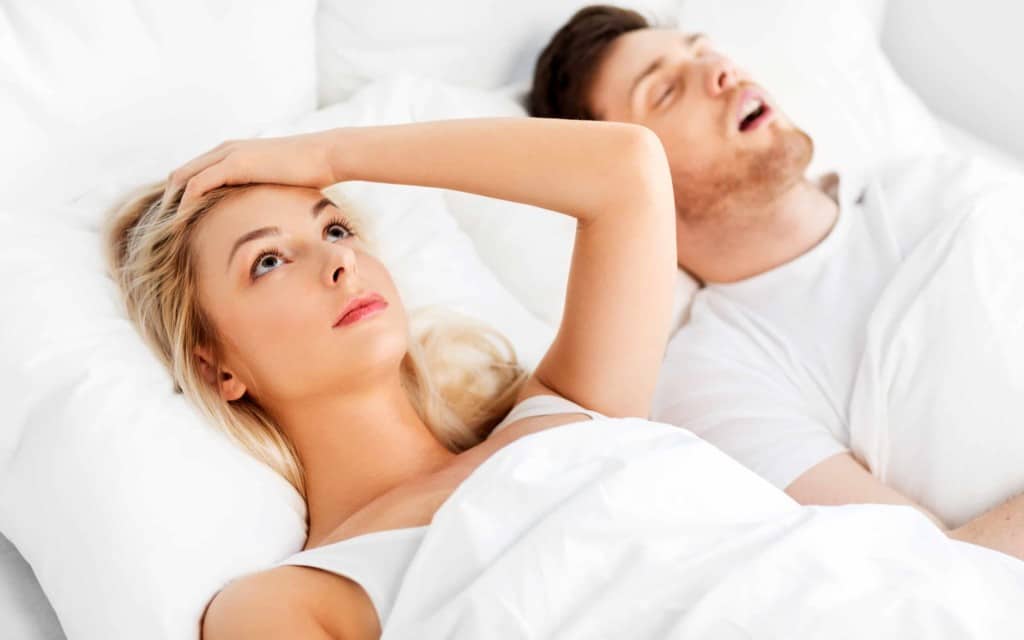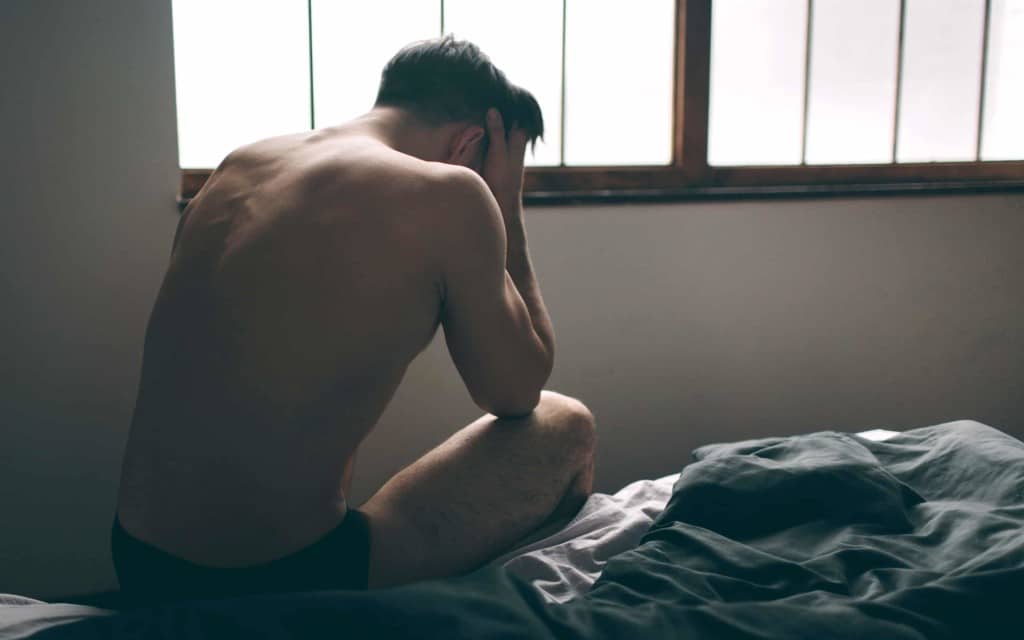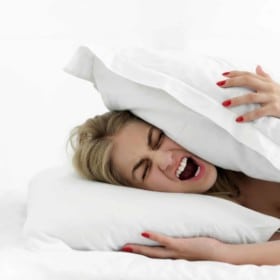Sleep is a big deal.
Get enough restful sleep each night, and you can become the best version of yourself.
Sleep helps you to process your emotions, improve the performance of your immune system, and even overcome illnesses. So when we don’t get enough sleep, it’s easy to see how we can begin to experience problems.
Sleep deprivation is the problem that occurs when you don’t get your recommended 7-9 hours of sleep each night. The more sleep-deprived you are, the more symptoms you’ll experience, from diminished mental abilities to a higher risk for serious health problems.
If you’re a little hazy on the facts about sleep deprivation, don’t worry.
We’ve brought you this quick-fire list of important information that you need to know about losing sleep.
Let’s get started.

Sleep deprivation fact #1: It’s caused by many different things
One of the first things you need to know about sleep deprivation is that just about anything can cause it. As important as sleep might be to our health, we can easily lose out on it when something in our environment changes.
For instance:
- New parents lose 44 days of sleep in the first year of their child’s life. To put that into perspective, you’re missing around 1,055 hours of sleep!
- If you’re flying, the altitude of your plane can cause sleep deprivation. One of the most interesting sleep facts we’ve seen is that an altitude of 13,200 increases sleep disruption.
- Snoring is the primary cause of sleep deprivation for about 90 million adults! Snoring doesn’t just wake your partner up — it harms your sleep too.
Sleep deprivation fact #2: It impacts your central nervous system
Next on our list of sleep deprivation facts and statistics, did you know that the less sleep you get, the worse your central nervous system functioning becomes?
Your central nervous system manages the information sent between your brain and body. It relies on sleep to operate fully, but chronic insomnia changes the way that your body sends and manages information.
Usually, when you’re sleeping, pathways will form between the neurons in your brain, helping you to remember the things that you learn.
If you’re sleep-deprived, then you can’t form those pathways, making it harder to concentrate or remember lessons learned. The signals your brain sends to your body are also lessened, increasing your chance of accidents.
Sleep deprivation fact #3: It makes you emotional
When it comes to sleep facts, this one probably isn’t a big surprise. Sleep deprivation affects your mental abilities and emotional state significantly, making you more prone to mood swings and issues like depression or anxiety.
The less sleep you get, the more the amygdala (the emotional centre of your brain) suffers. If your deprivation lasts long enough, you could begin hallucinating or seeing things that aren’t there.
Lack of sleep also triggers mania in people with bipolar disorder. The psychological risks range all the way from paranoia, to suicidal thoughts.
Sleep deprivation fact #4: It can’t last forever
This is one of the more reassuring facts about sleep deprivation we have.
No matter how convinced you are that you’re never going to get to sleep, you won’t stay awake forever. The human body has fail-safes built in to ensure that you get the rest that you need to stay alive.
Eventually, if you’re sleep-deprived enough, you’ll experience something called “micro-sleeps”.
During micro-sleeps, your brain shuts down for just a few seconds at a time. This can be quite dangerous, particularly if you’re operating machinery or driving.

Sleep deprivation fact #5: It makes you sick
Although sleep deprivation studies suggest that you can’t die from a lack of sleep, your risk of various illnesses can be increased. One of the reasons for this is that sleep deprivation affects your immune system.
Usually, when you’re sleeping, your body will produce infection-fighting proteins like cytokines.
Without the right dose of cytokines, you’ll struggle to fight off illnesses when they arrive.
Additionally, as many sleep facts suggest, the worse you sleep, the less capable you’ll be of recovering from diseases too.
Sleep deprivation fact #6: It increases your risk of chronic conditions
A lack of sleep doesn’t just make you prone to short-term ailments. The less you sleep, the higher your chances of chronic conditions like heart diseases and diabetes become.
Sleep issues are particularly problematic for your heart. One study found that people who don’t sleep enough are more likely to experience strokes and heart attacks.
Sleep affects processes that keep your blood vessels and heart-healthy, including your blood pressure, blood sugar, and inflammation levels. Sleep also plays an essential role in the body’s ability to repair the heart and blood vessels.
Sleep deprivation fact #8: It affects your respiratory system
If you’ve heard of sleep apnea, then you’ll know that your breathing and respiratory system can increase your chances of sleep deprivation.
However, you may not have known that the relationship between sleep and breathing goes both ways.
When we examine facts about sleep deprivation, we discover that just as night-time sleep apnea can increase your chances of disrupted sleep, lost sleep can worsen respiratory conditions.
The more you suffer from a lack of sleep, the more likely it is that you’ll experience greater problems with your lungs or obstructive sleep apnea

Sleep deprivation fact #9: It impacts your relationship with food
It’s not just lack of exercise and poor nutrition habits that can make you more likely to suffer from obesity.
According to interesting sleep facts provided by excessive study, sleep affects the way that you process food too.
Your sleeping cycle has a significant impact on two crucial hormones in your body: leptin and ghrelin.
The less you sleep, the more ghrelin you produce, and the less leptin you have. This means you feel less satisfied when eating food, and more hungry.
Lack of sleep also prompts your body to increase higher levels of insulin after you eat. Since insulin controls your blood sugar levels, higher insulin amounts can promote fat storage too.
Sleep deprivation fact #10: It messes with your hormones
Hormone production is dependent on a good night’s sleep. To produce testosterone, for instance, you need at least three hours of uninterrupted sleep.
The more you wake up through the night, or struggle to stay asleep, the more your hormone production suffers.
Poor sleep also impacts your growth hormone production, particularly in adolescents and children.
These hormones can help with building muscle mass and repairing tissues and cells. If you don’t have enough growth hormone, you can struggle to grow properly.
Sleep deprivation fact #11: It causes accidents
Sleep deprivation is dangerous for a number of reasons.
The less you sleep, the more you’re exposed to hazardous illnesses and hormonal issues. However, sleep can also make you clumsy and uncoordinated, increasing your risk of accidents.
Sleep deprivation was a factor in some of the biggest disasters in human history, including the nuclear meltdown at Chernobyl.
Losing sleep also means that you’re more likely to get involved in accidents on the road or at work.

Sleep deprivation fact #12: It kills sex drive
Sleep loss doesn’t just damage your ability to concentrate or perform well at work. The less you sleep, the more likely it is that you’ll have problems with your sex drive too.
Sleep facts tell us that men and women who are low on sleep have less interest in sex.
For men suffering from sleep apnea, there’s another problem to consider.
Studies found that people with sleep apnea often have lower testosterone levels because they can’t stay asleep long enough to produce the hormone fully.
Less testosterone often leads to a reduced sex drive.
Sleep deprivation fact #13: It’s depressing
You don’t have to be a scientist to know that lack of sleep can be seriously upsetting. In some cases, lack of sleep and common sleep disorders can even contribute to symptoms of depression.
Similarly, depression can also increase your chances of sleep deprivation. One study conducted in America found that people with depression or anxiety often slept fewer than 6 hours per night.
Depression and sleep disorders often feed each other. While a lack of sleep aggravates symptoms of depression, depression makes it more difficult to fall asleep.
Sleep deprivation fact #14: It ages you
Beauty sleep is a real thing.
Most people experience puffy eyes and sallow skin after a few nights without sleep. However, the more you miss out on a good night’s sleep, the worse your appearance becomes.
One of the biggest reasons that sleep deprivation ages you is that lack of sleep causes your body to release more cortisol.
In excess, cortisol breaks down skin collagen, the protein that helps your skin to look smooth and youthful.
Sleep loss also harms your ability to release growth hormone, which helps to thicken and strengthen skin as you age.

Addressing the facts about sleep deprivation
Sleep deprivation is an often confusing issue for many people.
When you’re sleep-deprived, you can suffer from a wide range of symptoms, from a higher risk of chronic health conditions to increased feelings of depression and anxiety.
What’s more, sleep deprivation affects your judgment, making it harder for you to determine what you should do next to overcome your problems.
If you’re concerned about sleep deprivation and need more facts to guide you, try talking to your doctor. A medical professional will be able to deliver dedicated treatment that’s specific to your condition.
Siestio. Sleep Matters.
Medical disclaimer
You must not rely on the information provided on our website as an alternative to medical advice from your doctor or other healthcare professionals. For more information read our full disclaimer here.







